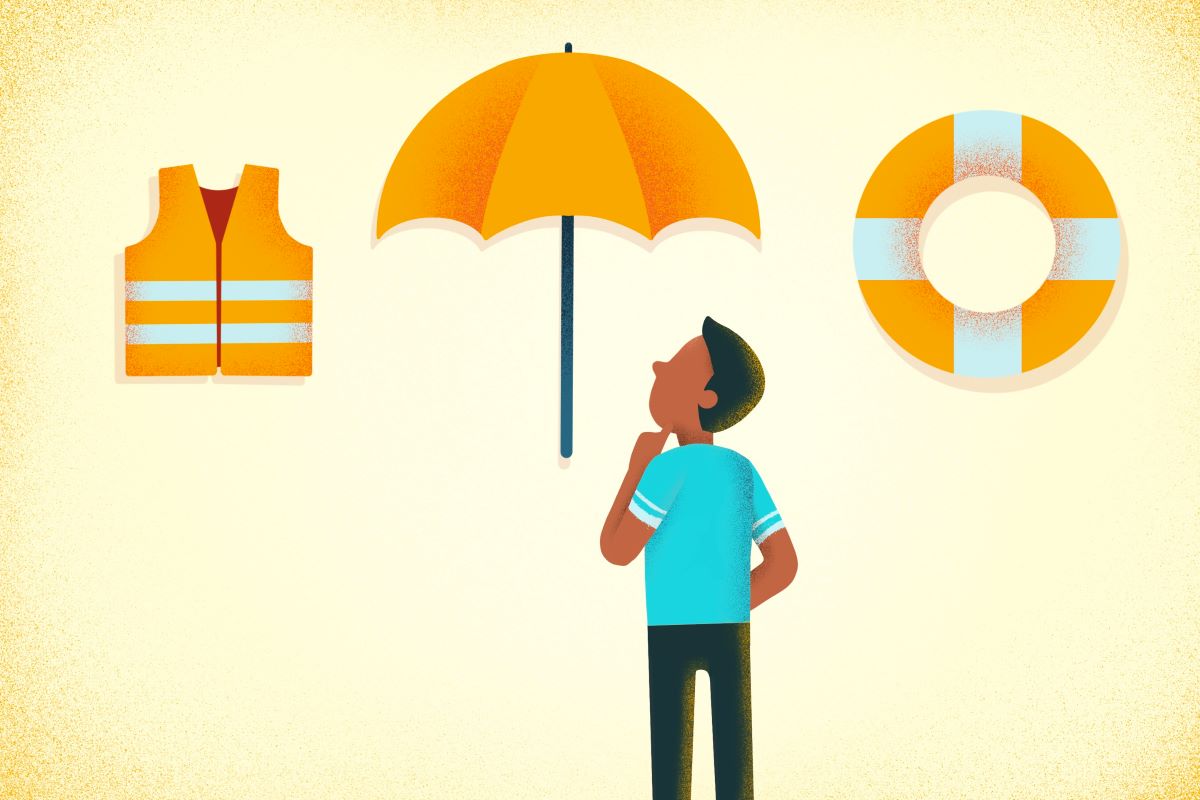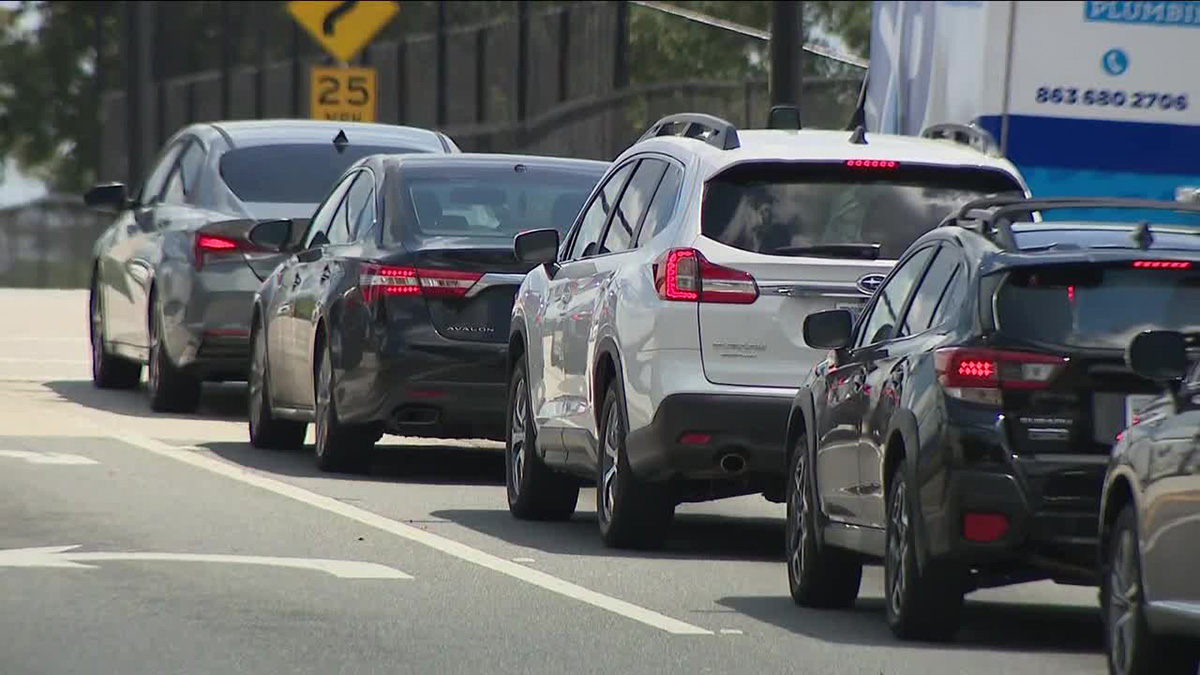

Finance
What Is PIP Insurance In Florida?
Published: November 28, 2023
Learn about PIP insurance in Florida, an essential coverage that protects you financially in case of an accident. Understand its importance and benefits.
(Many of the links in this article redirect to a specific reviewed product. Your purchase of these products through affiliate links helps to generate commission for LiveWell, at no extra cost. Learn more)
Table of Contents
- Overview of PIP Insurance
- Understanding PIP Coverage
- Florida’s Mandatory PIP Requirements
- PIP Insurance Benefits in Florida
- PIP Insurance Limits in Florida
- Exclusions and Limitations of PIP Insurance
- Filing a PIP Insurance Claim in Florida
- PIP Insurance and Medical Payments Coverage
- PIP Insurance vs. Bodily Injury Liability Coverage
- PIP Insurance vs. Health Insurance
- Importance of PIP Insurance in Florida
Overview of PIP Insurance
Personal Injury Protection (PIP) insurance is a type of auto insurance coverage that provides medical and financial benefits after a car accident. It is designed to cover the medical expenses, lost wages, and other related costs resulting from an accident, regardless of who was at fault. PIP insurance is mandatory in some states, including Florida.
Unlike traditional auto insurance policies that rely on determining fault and liability, PIP insurance is a no-fault insurance system. This means that regardless of who caused the accident, each person involved is responsible for their own medical expenses and other accident-related costs, up to the policy’s limits.
PIP insurance can help bridge the gap between health insurance coverage and the high costs associated with medical treatment, rehabilitation, and recovery from car accidents. It provides quick access to funds for immediate medical attention and covers expenses such as ambulance services, hospital stays, surgical procedures, diagnostic tests, and rehabilitation therapy.
In addition to medical expenses, PIP insurance may also cover a portion of lost wages resulting from the accident. This can be particularly beneficial for individuals who are unable to work due to their injuries and need financial support during their recovery.
It is important to note that PIP insurance only covers expenses up to the policy limits. These limits are set by the insurance company and may vary depending on the policyholder’s chosen coverage level. It is essential to carefully review the policy terms, coverage limits, and any exclusions or limitations before purchasing PIP insurance.
Understanding PIP Coverage
Personal Injury Protection (PIP) coverage is designed to provide financial protection for individuals involved in car accidents. It typically covers medical expenses, lost wages, and certain other costs, regardless of who caused the accident.
Policies that include PIP coverage may vary in terms of the specific benefits offered and the coverage limits. However, the fundamental principle remains the same – PIP coverage provides reimbursement for necessary medical treatment and related costs resulting from an accident.
In addition to medical expenses, PIP coverage may also include benefits such as funeral expenses, rehabilitation services, and even childcare expenses for those who are unable to care for their children due to accident-related injuries.
PIP coverage is meant to cover the policyholder and their household members, as well as passengers in the insured vehicle at the time of the accident. Some policies may extend coverage to pedestrians who are involved in accidents with the insured vehicle.
When it comes to determining the coverage limits, policyholders typically have the option to select the amount they’d like to be covered for. In some cases, state regulations may dictate minimum coverage requirements.
It’s worth noting that PIP coverage is available in states that have adopted no-fault insurance systems. In these states, drivers are required to carry PIP coverage as part of their auto insurance policy.
One of the key advantages of PIP coverage is its prompt payment feature. Unlike other types of auto insurance claims which may take time to process and establish fault, PIP benefits are typically paid out quickly, ensuring that accident victims have immediate access to the necessary funds for medical treatment and recovery.
Overall, understanding the scope of PIP coverage and its benefits is important for all drivers. It provides a safety net that can help mitigate the financial burden resulting from car accidents, regardless of fault, and ensures that individuals receive necessary medical care without delay.
Florida’s Mandatory PIP Requirements
In the state of Florida, Personal Injury Protection (PIP) insurance is mandatory for all registered vehicle owners. The purpose of this requirement is to ensure that individuals involved in car accidents have access to immediate medical benefits, regardless of who was at fault.
Florida law mandates that all drivers carry a minimum of $10,000 in PIP coverage as part of their auto insurance policy. This coverage is intended to provide reimbursement for medical expenses, lost wages, and certain other costs resulting from an accident.
It’s important to be aware that Florida’s PIP coverage is subject to the deductible. This means that policyholders are responsible for paying a certain amount out-of-pocket before PIP benefits kick in. The deductible can range from $0 to $2,500, depending on the policyholder’s preferences and the terms of their insurance policy.
Another important aspect of Florida’s PIP requirements is the time constraint for seeking medical treatment. In order to be eligible for PIP benefits, individuals must seek medical attention within 14 days following an accident. Failure to do so may result in the denial of PIP coverage.
Additionally, it is worth noting that PIP insurance only covers 80% of medical expenses and 60% of lost wages, up to the policy limits. This means that individuals are responsible for the remaining 20% of medical expenses and 40% of lost wages.
Furthermore, Florida law restricts the types of medical professionals who can provide treatment for PIP coverage. Treatment must be provided by a licensed medical doctor, osteopathic physician, dentist, or chiropractor. Treatment from acupuncturists and massage therapists is not covered under PIP benefits in Florida.
Given the mandatory nature of PIP insurance in Florida, it is essential for all vehicle owners to comply with the state’s requirements. Failure to maintain the minimum required coverage can result in legal penalties, such as fines and license suspension.
Overall, understanding Florida’s mandatory PIP requirements is crucial for drivers in the state. By fulfilling these requirements, individuals can ensure that they are protected in the event of a car accident and have access to the necessary medical benefits for their recovery.
PIP Insurance Benefits in Florida
Personal Injury Protection (PIP) insurance in Florida offers several benefits to individuals involved in car accidents. These benefits are designed to provide financial support and access to necessary medical treatment in a timely manner. Here are some of the key benefits of PIP insurance in Florida:
- Medical Expense Coverage: PIP insurance covers the cost of medical treatment and related expenses resulting from a car accident. This includes doctor’s visits, hospital stays, surgeries, medications, rehabilitation therapy, and other necessary medical services.
- Lost Wages Coverage: PIP insurance can also provide compensation for lost wages if an individual is unable to work due to accident-related injuries. This coverage helps to minimize the financial burden that may result from missed workdays during the recovery period.
- Death Benefit: In the unfortunate event of a fatal car accident, PIP insurance in Florida provides a death benefit to the surviving family members. This benefit helps cover funeral expenses and offers some financial support during a difficult time.
- Immediate Access to Funds: PIP insurance offers a prompt payment feature, ensuring that accident victims receive immediate access to funds for medical treatment and related expenses. This eliminates the need to wait for fault determination or lengthy claims processing.
- No-Fault Coverage: PIP insurance is a no-fault insurance system, which means that individuals are covered regardless of who caused the accident. This eliminates the need to establish fault and simplifies the claims process.
These benefits provided by PIP insurance can greatly alleviate the financial stress and uncertainty that often accompanies car accidents. They help ensure that individuals have the necessary resources to receive timely and appropriate medical care, focus on their recovery, and get back on their feet.
PIP Insurance Limits in Florida
In Florida, Personal Injury Protection (PIP) insurance coverage comes with certain limits that policyholders should be aware of. These limits determine the maximum amount that can be paid out for medical expenses, lost wages, and other covered expenses resulting from a car accident. Understanding these limits is crucial to ensure adequate coverage and financial protection.
As of 2021, the minimum PIP coverage limit required by Florida law is $10,000. This means that if you are injured in an accident, your PIP coverage will provide up to $10,000 worth of benefits to cover your medical costs and lost wages. However, it’s important to note that this coverage will only pay 80% of medical expenses and 60% of lost wages, up to the policy limit.
While the minimum limit is $10,000, policyholders have the option to purchase higher coverage limits, depending on their individual needs and budget. Higher coverage limits can provide additional financial protection and ensure that you have sufficient funds to cover expenses in the event of a more serious accident.
It is essential to carefully review your policy and understand the coverage limits that apply to your PIP insurance. By doing so, you can determine if the coverage amount is adequate for your specific situation and make an informed decision about whether to increase your coverage limits if necessary.
It’s worth noting that in some cases, your PIP coverage may exhaust before all of your medical expenses are covered. In such situations, you may need to rely on other insurance coverages or pursue legal action against the at-fault party to seek compensation for the remaining expenses.
Additionally, it is important to be aware that PIP coverage is subject to deductibles. A deductible is the amount you must pay out-of-pocket before your PIP coverage kicks in. The deductible amount can range from $0 to $2,500, depending on your policy terms and preferences.
To make an informed decision about your PIP coverage limits, it may be beneficial to consult with an insurance agent or financial advisor who can assess your individual circumstances and help you determine the appropriate coverage level to protect yourself and your assets.
Exclusions and Limitations of PIP Insurance
While Personal Injury Protection (PIP) insurance in Florida provides essential coverage for medical expenses and lost wages after a car accident, it’s important to understand that there are certain exclusions and limitations to this coverage. Being aware of these exclusions and limitations can help you better navigate your insurance policy and understand what expenses may not be covered. Here are some common exclusions and limitations of PIP insurance in Florida:
- Non-covered expenses: PIP insurance typically does not cover all types of medical treatments. Procedures that are considered experimental or not medically necessary may be excluded from coverage. Cosmetic procedures and elective treatments are generally not covered under PIP insurance.
- Exceeding policy limits: PIP insurance in Florida has coverage limits, which means that once you exceed the maximum benefit amount specified in your policy, you will be responsible for paying any additional expenses out of pocket. It’s important to understand your coverage limits and plan accordingly.
- Uninsured or underinsured motorists: PIP insurance covers medical expenses and lost wages for accidents involving other insured drivers. However, it may not cover accidents involving uninsured or underinsured motorists. To protect yourself in such situations, you may need to consider additional coverage options, such as uninsured/underinsured motorist coverage.
- Time limitations: PIP insurance may have time constraints on when you can claim benefits. In Florida, individuals are required to seek medical treatment within 14 days of the accident to be eligible for PIP benefits. Failing to meet this deadline can result in the denial of coverage.
- Specific providers: PIP insurance in Florida may limit the type of healthcare providers that you can receive treatment from. Generally, treatment must be provided by licensed medical doctors, osteopathic physicians, dentists, or chiropractors. Treatment from non-qualified providers may not be covered under PIP benefits.
- Intentional acts: PIP insurance typically does not cover injuries resulting from intentional acts or criminal activities. If your injuries are caused by your own intentional actions or involvement in criminal activities, your PIP insurance may not provide coverage for the associated medical expenses or lost wages.
Understanding the exclusions and limitations of your PIP insurance policy is crucial to managing your expectations and avoiding potential surprises when filing a claim. It’s important to review and familiarize yourself with the specific terms, provisions, and exclusions of your policy, and consult with your insurance provider for detailed information on what is covered and what is not.
Filing a PIP Insurance Claim in Florida
When you are involved in a car accident and need to utilize your Personal Injury Protection (PIP) insurance in Florida, it is important to understand the steps involved in filing a PIP insurance claim. Filing a claim promptly and accurately will help ensure that you receive the benefits you are entitled to. Here is a step-by-step guide on how to file a PIP insurance claim in Florida:
- Seek medical attention: After a car accident, it is important to seek medical attention within 14 days. Failure to do so may result in the denial of your PIP claim. Make sure to keep detailed records of all your medical treatments, bills, and any other relevant documentation.
- Inform your insurance company: Notify your insurance company as soon as possible about the accident and your intention to file a PIP claim. Provide them with accurate and detailed information about the accident, including the date, time, location, and any other relevant details.
- Complete the necessary paperwork: Your insurance company will provide you with the necessary claim forms to fill out. Make sure to complete the forms accurately and include all requested information. You may also need to provide supporting documentation, such as medical records, bills, and proof of lost wages.
- Submit the claim: Once you have completed the required paperwork, submit the claim to your insurance company. You can typically do this online, through email, or by mail. Make sure to keep copies of all documents for your records.
- Cooperate with the insurance company: Your insurance company may require additional information or documentation to process your claim. Cooperate with their requests and provide any necessary information in a timely manner. This will help ensure a smooth claims process.
- Review the claim decision: Once your insurance company has reviewed your claim, they will make a decision regarding the benefits you are entitled to receive. Review the decision carefully to ensure that it aligns with your expectations and the coverage provided by your policy.
- Appeal if necessary: If you believe that your claim was unfairly denied or if you disagree with the benefits provided, you have the right to appeal the decision. Follow the appeals process outlined by your insurance company and provide any additional information or documentation that supports your case.
- Follow up on payments: If your claim is approved, your insurance company will issue payments for the covered benefits. Keep track of the payments and make sure that you receive the appropriate amount. If there are any issues or discrepancies, contact your insurance company to resolve them.
It is important to remember that the exact process for filing a PIP insurance claim may vary depending on your insurance provider. Always refer to your policy documents and contact your insurance company directly for specific instructions and guidance on filing a claim.
PIP Insurance and Medical Payments Coverage
Personal Injury Protection (PIP) insurance and Medical Payments (MedPay) coverage are both types of auto insurance coverage that provide financial assistance for medical expenses resulting from car accidents. While they may appear similar, there are some key differences between the two. Understanding these differences can help you determine which coverage option is best suited to your needs. Here’s a closer look at PIP insurance and MedPay coverage:
PIP Insurance: PIP insurance is mandatory in some states, including Florida, and provides coverage for medical expenses, lost wages, and other related costs resulting from a car accident. PIP insurance is a no-fault insurance system, meaning it covers individuals regardless of who was at fault for the accident. It provides broader coverage compared to MedPay and typically has higher coverage limits. PIP insurance may also cover additional benefits such as funeral expenses and rehabilitation services.
Medical Payments (MedPay) Coverage: Unlike PIP insurance, MedPay coverage is optional and not required by law. It is an optional coverage that can be added to an auto insurance policy. MedPay coverage specifically provides reimbursement for medical expenses resulting from a car accident, regardless of fault. MedPay coverage is typically more limited in scope compared to PIP insurance and may have lower coverage limits. However, one advantage of MedPay is that it can provide coverage for medical expenses that exceed the policyholder’s health insurance coverage limits.
While both PIP insurance and MedPay coverage offer assistance with medical expenses, the decision to choose one over the other depends on your individual circumstances and needs. PIP insurance provides broader coverage and is typically required by law in certain states, including Florida. MedPay coverage, on the other hand, is an optional coverage that can be added to your auto insurance policy to supplement any existing health insurance coverage.
It’s important to review your policy documentation carefully to understand the specific terms, exclusions, and coverage limits of both PIP insurance and MedPay coverage. Consider factors such as your state’s insurance requirements, the level of coverage you desire, and your personal circumstances when deciding which coverage option is right for you.
Consulting with an insurance agent or a knowledgeable professional can also help you navigate through the various coverage options and determine the best insurance strategy to protect yourself and your assets in the event of a car accident.
PIP Insurance vs. Bodily Injury Liability Coverage
When it comes to auto insurance coverage, two important types to consider are Personal Injury Protection (PIP) insurance and Bodily Injury Liability coverage. While both provide coverage for injuries resulting from car accidents, there are significant differences between the two. Understanding these differences is crucial to ensure you have the right coverage for your needs. Let’s compare PIP insurance and Bodily Injury Liability coverage:
PIP Insurance: PIP insurance is a type of coverage that provides benefits for medical expenses, lost wages, and other related costs resulting from a car accident, regardless of fault. In states where PIP insurance is mandatory, including Florida, drivers are required to carry this coverage. PIP insurance provides benefits to the policyholder and their passengers, and it generally covers a portion of medical costs and lost wages up to the policy limits. PIP insurance focuses on providing coverage for the policyholder’s own injuries and expenses.
Bodily Injury Liability Coverage: Bodily Injury Liability coverage, on the other hand, is a type of coverage that pays for injuries or death of other individuals when the policyholder is at fault in a car accident. It provides financial protection in case the policyholder is legally responsible for causing harm to another person. Bodily Injury Liability coverage is typically expressed as two separate limits, with the first limit representing the maximum amount payable per person and the second limit indicating the maximum payable per accident.
The main difference between PIP insurance and Bodily Injury Liability coverage is the focus of coverage. PIP insurance covers the policyholder’s own medical expenses and lost wages, regardless of fault. In contrast, Bodily Injury Liability coverage provides coverage for injuries and expenses of others in case the policyholder is at fault in an accident.
In states where PIP insurance is mandatory, it is important to have both PIP insurance and Bodily Injury Liability coverage. PIP insurance provides coverage for your own expenses, while Bodily Injury Liability coverage protects you from potential lawsuits and provides compensation for others if you are at fault in an accident.
It’s important to carefully review your policy documents, consult with your insurance agent, and consider your state’s insurance requirements to ensure you have the appropriate coverage. By having both PIP insurance and Bodily Injury Liability coverage, you can have peace of mind knowing that you are protected in various scenarios on the road.
PIP Insurance vs. Health Insurance
When it comes to covering medical expenses resulting from a car accident, there are two primary types of insurance to consider: Personal Injury Protection (PIP) insurance and Health Insurance. While both types of insurance provide coverage for medical expenses, there are some important distinctions between the two. Understanding these differences can help you make informed decisions about your coverage needs. Let’s compare PIP insurance and Health Insurance:
PIP Insurance: PIP insurance is designed specifically for car accidents and is mandatory in some states, including Florida. PIP insurance covers medical expenses, lost wages, and other accident-related costs, regardless of who was at fault. It provides quick access to funds for immediate medical attention and ensures that individuals are taken care of following an accident. PIP insurance has coverage limits that vary depending on the policy, and it typically covers a percentage (usually around 80%) of medical costs and lost wages up to the policy limit. PIP insurance focuses on providing coverage for injuries and expenses resulting from car accidents.
Health Insurance: Health Insurance, on the other hand, is a broader type of coverage that provides benefits for a range of medical expenses, including routine healthcare, preventive care, hospitalizations, medications, and surgeries. Health Insurance is not specific to car accidents and covers medical expenses resulting from various causes, such as illness and injuries not related to car accidents. Health Insurance typically has its own structure of deductibles, copayments, and coverage limits, which vary depending on the specific policy and insurance provider.
The key difference between PIP insurance and Health Insurance is the scope of coverage and the triggering event. PIP insurance specifically covers medical expenses resulting from car accidents, while Health Insurance covers a wider range of medical expenses regardless of the cause. PIP insurance offers more immediate access to funds for immediate medical needs following an accident, whereas Health Insurance provides comprehensive coverage for various healthcare needs over a longer term.
It’s important to note that PIP insurance and Health Insurance can work together to provide comprehensive coverage. In the event of a car accident, PIP insurance can provide immediate benefits to cover medical expenses up to the policy limits. Health Insurance can then complement PIP coverage by providing ongoing coverage for necessary medical treatments beyond the limits of PIP insurance.
Reviewing your insurance policies, understanding their coverage limits, and consulting with insurance professionals can help you determine the best combination of coverage to protect yourself in the event of a car accident. By having a clear understanding of the benefits offered by both PIP insurance and Health Insurance, you can ensure that you have the appropriate coverage for your medical needs.
Importance of PIP Insurance in Florida
Personal Injury Protection (PIP) insurance is of utmost importance for residents of Florida. As a no-fault insurance system, PIP coverage provides crucial benefits and financial protection for individuals involved in car accidents. Here are some key reasons why PIP insurance is essential in Florida:
Immediate Access to Medical Treatment: Following a car accident, timely medical treatment is crucial for a swift recovery. PIP insurance ensures that accident victims have immediate access to necessary medical attention without having to wait for fault determination or lengthy claims processing procedures. This swift access to medical treatment can significantly impact the outcome and recovery process.
Financial Protection for Medical Expenses: Medical expenses can quickly add up in the aftermath of a car accident. PIP insurance in Florida covers a portion of medical expenses up to the policy limits. This financial protection helps individuals manage the costs associated with hospital stays, surgeries, therapies, medications, and rehabilitation services. Without PIP insurance, accident victims may be burdened with overwhelming medical bills.
Lost Wage Reimbursement: Injuries resulting from car accidents can lead to missed workdays and lost wages. PIP insurance in Florida provides coverage for a portion of lost wages, ensuring that individuals have some financial stability during their recovery. This benefit can help alleviate the financial strain that often accompanies accidents and provides support during a challenging time.
No-Fault Coverage: Florida operates under a no-fault insurance system, meaning that individuals are covered by their own insurance regardless of who was at fault for the accident. PIP insurance aligns with this system, ensuring that individuals receive benefits regardless of fault. This system allows for faster resolution of claims and helps streamline the process for accident victims.
Mandatory Requirement: PIP insurance is mandatory in Florida, so all vehicle owners are legally obligated to carry it. Failure to comply with this requirement can result in penalties, fines, and even the suspension of a driver’s license. Thus, it is of utmost importance to have valid PIP insurance coverage to meet legal obligations and ensure compliance with state regulations.
Overall, PIP insurance plays a vital role in providing immediate medical benefits, financial protection, and a level of security for individuals involved in car accidents. With PIP insurance, accident victims can focus on their recovery and receive necessary medical treatments without the added burden of financial stress. It is essential for Floridians to understand the importance of PIP insurance and ensure they have adequate coverage to safeguard their well-being in the event of an accident.














